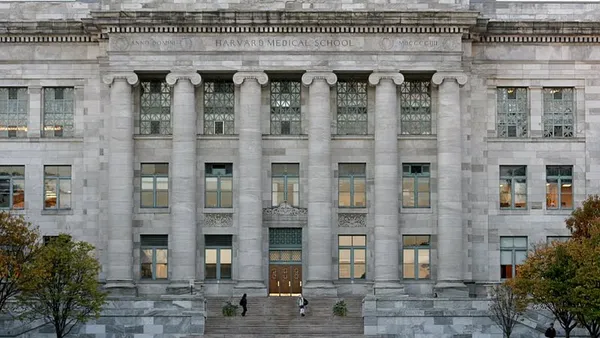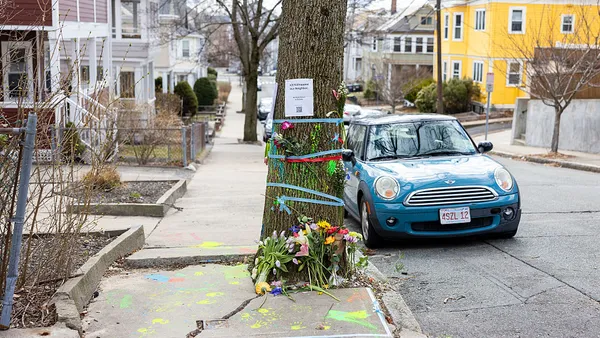Dive Brief:
- Columbia University Interim President Katrina Armstrong abruptly stepped down from the institution’s top leadership spot Friday to return to her role as CEO of the university’s Irving Medical Center. Armstrong had only served since mid-August.
- Her presidency was marked by tumult over pro-Palestinian protests and the Trump administration’s move to cancel in $400 million in federal contracts and grants. “My heart is with science, and my passion is with healing,” Armstrong said in a statement. “That is where I can best serve this University and our community moving forward.”
- Stepping in as acting president is Claire Shipman, co-chair of Columbia’s trustee board and a board member since 2013. In a statement, Shipman said she would “work with our faculty to advance our mission, implement needed reforms, protect our students, and uphold academic freedom and open inquiry.”
Dive Insight:
One of Armstrong’s last acts as Columbia’s president — and arguably her most consequential — was ceding to the Trump administration’s long list of demands in the hopes of keeping federal funding flowing to the university.
The government targeted Columbia in early March through the Joint Task Force to Combat Anti-Semitism — a multi-agency coalition created by President Donald Trump through a January executive order.
The task force said it launched an investigation into Columbia over what it alleged was a failure to protect Jewish students from harassment, citing encampments and demonstrations that Education Secretary Linda McMahon said “completely paralyzed day-to-day campus operations, depriving Jewish students of learning opportunities.”
Protest encampments established in April last year were cleared and dozens of protestors arrested after administrators called in police twice that month.
Only a few days after the Trump administration announced the investigation, four federal agencies said they would collectively cut $400 million in funding to the university.
A week later, the Trump administration followed with an expansive list demands for Columbia to keep the federal funding, including ramping up security, doling out suspensions and expulsions to pro-Palestinian protestors, and the university taking administrative control of its Middle East, South Asian and African Studies department.
Columbia under Armstrong ceded to many of the demands. That includes the hiring of three dozen “special officers” with power to make arrests and remove people from campus “when appropriate,” and creating a senior vice provost position to oversee the university’s regional studies department.
The senior vice provost is tasked with conducting “thorough review of the portfolio of programs in regional areas across the University, starting immediately with the Middle East,” according to a memo from the president’s office.
In introducing the changes, Armstrong said that the university was “guided by our values, putting academic freedom, free expression, open inquiry, and respect for all at the fore of every decision we make.”
The federal task force called Columbia’s moves “a positive first step in the university maintaining a financial relationship with the United States government.”
Last week, the American Association of University Professors and the American Federation of Teachers sued the Trump administration over its demands and threat of defunding the university.
In their complaint, the unions called the Trump administration’s actions an “unlawful and unprecedented effort to overpower” Columbia University’s academic autonomy and “control the thought, association, scholarship, and expression of its faculty and students.”
Following Armstrong’s announced changes, she tried to reassure faculty that they would not undermine Columbia’s academic freedom, according to The Wall Street Journal, which cited a meeting transcript.
In conversations, she “downplayed the changes agreed to with the Trump team,” the Journal reported. For example, she said the appointment of a senior vice provost to the regional studies department wouldn’t impact its academic operations.
The university’s provost said, “The provost office is not going to tell anybody what to teach, ever,” according to the Journal.
Adding to the tension has been the arrest and detainment of Mahmoud Khalil, a former Columbia student who completed graduate studies in December and who represented student protesters in negotiations with the university's administrators to end the spring encampment.
This past weekend, some Columbia alumni destroyed their diplomas to protest the university’s capitulation to the Trump administration and Khalil’s detainment.
In a statement Friday, the Task Force to Combat Antisemitism praised the leadership changes at Columbia, citing an unspecified “concerning revelation” from the university last week and saying that Armstrong’s departure and replacement was an “important step toward advancing negotiations.”
Marcel Agüeros, secretary of the Columbia chapter of the AAUP, said that Armstrong’s “resignation changes almost nothing.”
“For the past two years we have been advocating for a greater role for faculty in the decision-making processes of the university,” Agüeros added. “That, and defending our university and all universities against unwanted and likely unlawful interference by the federal government, remains our North Star.”















